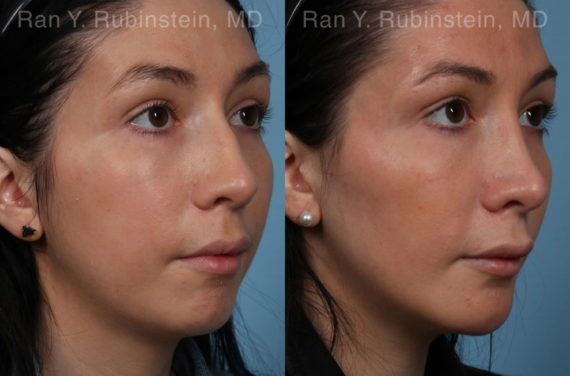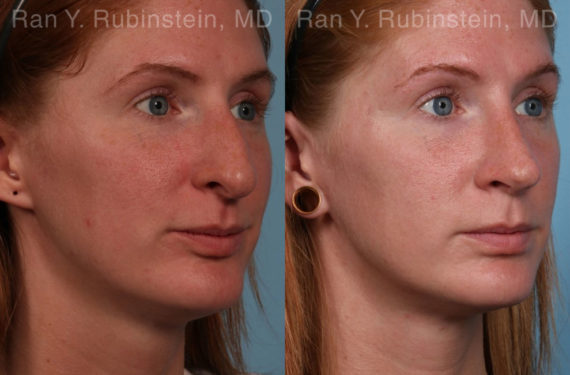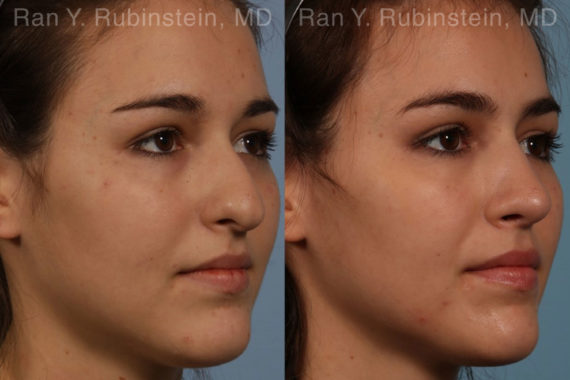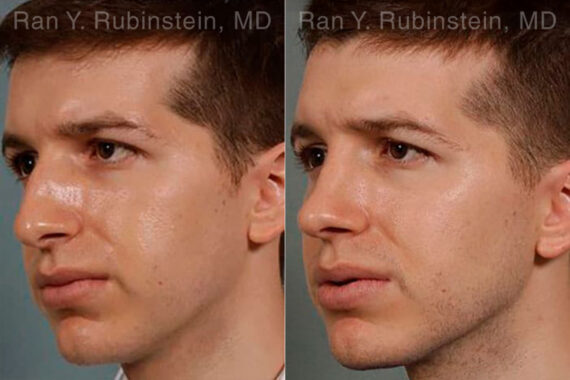How to Prepare for Rhinoplasty
Posted by Rubinstein Plastic Surgery Center

Are you thinking about rhinoplasty surgery and wondering what steps you should take to get the best experience and results? This transformative nose surgery is one of the most personalized procedures available, whether you’re refining your nostrils or nasal tip or addressing functional breathing concerns. It is completely normal to feel both excited and curious about what comes next.
As you begin planning for your procedure, you will discover that preparation plays a major role in your comfort and confidence. From learning what to expect at your consultation to mapping out your recovery process, taking the right steps ahead of time can make your entire journey smoother and more empowering.
How to Prepare for a Rhinoplasty Consultation
A rhinoplasty consultation gives you the opportunity to discuss your goals, review potential outcomes, and learn what is possible for your unique nasal structure. During this visit, your plastic surgeon will perform a physical examination to evaluate both cosmetic and functional considerations. This is an ideal time to ask questions about nose surgery techniques, the recovery process, and whether your expectations align with the results you hope to achieve.
You should also feel comfortable asking about insurance coverage when needed, especially if your procedure addresses a functional concern rather than cosmetic rhinoplasty, which is an elective surgery. Your surgeon will explain what falls under medical necessity and what does not, helping you understand your options clearly.
Before the appointment ends, expect to review surgical recommendations, postoperative instructions, and any lifestyle adjustments you may need to make. This conversation ensures you fully understand each step ahead and feel confident moving forward.
Weeks Before Rhinoplasty: Pre-Procedure Plan
In the weeks before surgery, preparing both your body and daily routine can make a meaningful difference in your rhinoplasty procedure experience. This phase is where you begin following your surgeon’s pre-op instructions, organize your schedule, and create a healthy foundation for recovery. Taking these early steps helps ensure you feel confident, supported, and fully ready for the day of surgery.
Mentally prepare for surgery
Getting mentally ready for a cosmetic surgery procedure can make your rhinoplasty journey feel far more comfortable. It helps to understand what the experience will involve, including the fact that incisions are placed discreetly so scars remain barely noticeable. After surgery, you’ll have a splint to support your nose as it begins to heal. Knowing what to expect and reminding yourself that these steps are part of a safe, predictable process can ease nerves and help you approach the procedure with confidence.
Schedule time off from work
Planning your time away from work or school is something you should handle weeks in advance, especially since resting well plays a big role in your recovery. Giving yourself enough space to heal without rushing back into your routine is always a good idea. This time away allows swelling to ease, helps you feel more comfortable, and ensures you return to daily activities at a pace that supports the best results.
Maintain a clean skin routine
Keeping your skin clean and balanced before surgery helps create the ideal environment for healing. A gentle skincare routine can reduce excess oil, minimize irritation, and lower the chance of breakouts near the surgical area. Avoid introducing new or harsh products during this time so your skin stays calm and predictable. Consistent, simple care supports a smoother experience both during and after your rhinoplasty.
Drink a lot of water
Staying hydrated is one of the easiest ways to support your body as it prepares for surgery. Drinking plenty of water helps regulate your system, keeps your skin healthier, and supports circulation. Proper hydration can also make the recovery period more comfortable. Making this a daily habit before surgery gives your body the strength it needs for the healing process.
Maintain a healthy diet
Eating nutritious meals before your procedure gives your body the fuel it needs for optimal healing. Focus on whole foods rich in vitamins, antioxidants, and protein to support tissue repair and overall wellness. Avoid excessive salt or heavily processed snacks, as these can contribute to inflammation. A balanced diet not only helps your body recover more efficiently but also helps you feel your best heading into surgery.
Quit nicotine and alcohol
Avoiding nicotine and alcohol before surgery is essential because both can interfere with anesthesia and impact how your body responds during the procedure. Nicotine restricts blood flow, while alcohol can increase bleeding risks, making the healing process slower and less predictable. Giving your body a clean, steady foundation in the weeks leading up to surgery supports safer results and a smoother recovery overall.
Prioritize quality sleep
Getting consistent, restful sleep is one of the best ways to support your immune system and overall well-being before rhinoplasty. Aim for steady sleep habits in the weeks leading up to your procedure, and try to be especially well rested the night before surgery. Quality sleep helps your body manage stress, promotes healthy healing, and prepares you both physically and mentally for the experience ahead.
Buy all your recovery supplies
Having everything you need at home makes recovery from rhinoplasty much smoother and less stressful. Stock up on essentials like cold compresses, gentle cleansers, and any prescription medications your surgeon recommends. Preparing your space also helps you stay comfortable and organized for the weeks after surgery. When these items are ready ahead of time, you can focus fully on resting and healing without last-minute errands.
Watch out for medication interactions
Before surgery, review all medications and supplements with your surgeon to avoid interactions that may affect your procedure. Certain blood-thinning medications, including common options like aspirin, can increase bleeding risks and lead to potential complications. Your surgeon will guide you on what to pause and what is safe to continue. Being careful with these details supports a smoother rhinoplasty recovery and helps ensure your body is prepared for healing.
Nose Job Patient Results




* All patients are unique and individual results may vary.
The Day Before Rhinoplasty: Pre-Surgery Instructions
The day before surgery is all about taking simple, thoughtful steps that help you feel prepared and at ease. Following your surgeon’s guidance during this final stretch ensures your body is ready and your mind is calm. These small preparations create a smoother experience on the morning of your rhinoplasty.
Do not eat before surgery
Your surgeon will give you clear fasting instructions to follow, and it is important to stick to them to ensure a safe anesthesia experience. Avoiding food and drinks for the required amount of time helps reduce risks during the day of surgery. Preparing for this in advance keeps your body ready and your procedure running smoothly.
Take a shower
A refreshing shower the night before or the morning of your procedure helps keep your skin clean and reduces the risk of bacteria near the surgical area. Use gentle products and avoid heavy lotions or oils. This simple step ensures you arrive feeling fresh and prepared, setting the stage for a smoother start to your rhinoplasty.
Go makeup-free
Arriving without makeup ensures that your skin is clean and unobstructed for surgery. Avoiding products like foundation, mascara, and lipstick helps reduce bacteria and keeps your skin in its natural state for the procedure. This simple step supports both safety and comfort as your surgical team prepares you for rhinoplasty.
Wear comfortable clothing
Choose loose, comfortable clothing that is easy to change out of and does not need to be pulled over your head. Front fastening tops are ideal, as they prevent pressure on your nose after surgery. Dressing thoughtfully helps you feel relaxed and makes the transition from pre op to recovery smoother and more convenient.
Achieve the best surgical results!
Get expert preparation advice from Rubinstein Plastic Surgery Center. Schedule your appointment now.
Consult with a Specialist Nose Surgeon Today
Choosing the right expert for rhinoplasty is essential because the nose is both a central facial feature and a complex structure. Working with an experienced facial plastic surgery specialist ensures that every detail is evaluated with precision so your results are both functional and aesthetically balanced. The right surgeon will guide you through the process with clarity and support.
At Becker Plastic Surgery, our team of board-certified surgeons brings decades of experience in rhinoplasty and other cosmetic procedures performed in our state-of-the-art surgical center. Whether your goals are cosmetic or functional, our specialists offer advanced training and a deep understanding of nasal anatomy. Schedule your appointment today by visiting our contact page or check our locations page to find the phone number for your nearest office in New Jersey or Philadelphia.